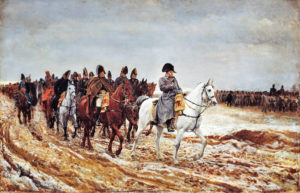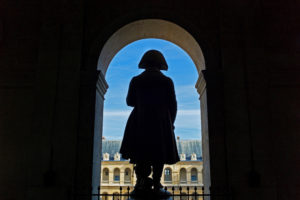L’Année Napoléon in Emmanuel Macron’s commemoration-hungry France, was a bit of a damp squib. In 2021, two centuries after the death of l’Empereur on St Helena’s Island, there was enough noise from the anti-colonialist crowd on his reintroduction of slavery in the West Indies in 1802-1804 (under pressure from local landowners) that a number of grandiose projected events were quietly cancelled or indefinitely postponed. Post-Covid and a year before Macron’s re-election campaign, it was felt that any unnecessary controversy should be prudently shelved.
It took Ridley Scott and his bloated Napoléon to rouse the serried ranks of French historians, politicians, journalists, museographers, military brass and amateur re-enacters against what is largely seen here as an attack against France’s best-known ruler and military genius. We’re getting L’Année Napoléon two years late — and enjoying every moment of it.
“Napoléon”, c’est le film d’un Anglais très antifrançais (“Napoleon is a movie made by an arch-anti-French Englishman”) sniffed the historian Patrice Gueniffey in Le Point, before engaging in a meticulous fact-checking exercise. (The entire Institut Napoléon has been producing a detachment of painstaking little French Hugo Vickers to protest, with a thousand details, that the superannuated, gloomy, inarticulate brute portrayed by Joaquin Phoenix is wrong, wrong, wrong). “This is worse than a just a bad film: Ridley Scott desecrates Napoleon”, the Sciences Po professor of media studies, Romain Marsily, thunders in Le Figaro.
For a country supposedly in the throes of existential gloom and masochistic self-doubt, there’s nothing like a perceived attack by bloody foreigners on a national legend to bring a lot of us together. A recent poll shows only 3% of the French mention the West Indies slavery reinstatement in their rating of Napoléon’s “worse decisions”.
Putting aside the police state that France inherited from the Revolution’s Committee of Public Safety, the first Napoléonic accomplishments the French praise are Napoleon’s legislative and administrative reforms, which pretty much baked Roman law, Louis XIV’s centralism and command economy, the philosophy of the Enlightenment, and the Revolution’s nation-building achievements into a consistent framework. It took four years — 1800 to 1804 — to write and collate the 2281 articles of the Civil Code, largely under the stewardship of the First Consul, as he was known at the time, himself (Bonaparte presided over 55 of the 107 writing sessions of the final version).
This, as much as his conquests, left an indelible mark in the law of places from Louisiana and Bolivia to Bavaria and Poland. You find the (translated) hand of Napoleon in the Japanese Civil Code of 1898, in Egyptian Law, in Mustafa Kemal Atatürk new Turkish Code. Half a century before Bismarck, the birth of modern Germany was facilitated by the breaking up of medieval laws and regulations and the power of guilds, as well as the expropriation, à la révolutionnaire, of the churches and the aristocratic landowners.
For a notion of the awe in which of Napoleon was held by his contemporaries, listen to his enemies. “Bonaparte was a poet in action, an immense genius in war, a tireless, skilful and sensible administrator, a hard-working and reasonable legislator. This is why he has such a hold on people’s imagination,” from Chateaubriand, a lifelong royalist whose regular diatribes in Le Mercure de France left no one in doubt of the contempt he held him in.
Or take the opening lines of Stendhal’s Charterhouse of Parma, written from the point of view of the Italian States invaded by the French: “On May 15, 1796, General Bonaparte entered Milan at the head of that young army which had lately crossed the Lodi bridge and taught the world that after so many centuries Caesar and Alexander had a successor. The miracles of valour and genius Italy had witnessed in a few months wakened a slumbering nation.”
The notion of gloire, which has disappeared from our modern world, belongs here to the Roman general’s triumph, the retelling of the Iliad, the tales of the Crusaders, which were part of a regular education. And so the French will talk of Napoleon’s victories — but crucially, his defeats became equally part of his myth. From the Retreat from Russia to that lone figure marooned on an island in the South Atlantic, they combine to create epic and tragedy. What, indeed, would posterity would have made of a Napoleon meekly ending his days as the ruler of Elba, a Mediterranean Ruritania without a Rassendyl, instead of escaping for a hundred days until he meets his, well, Waterloo.
Having frozen the political consequences of the Révolution during his 16-year rule, Napoleon’s shadow looms over most of the 19th century as his successors try, and mostly fail, to cope with the world after him. The after-effects of Bonapartisme, long after the Emperor’s death, fuelled every single uprising of the 19th century: the short years of the First Empire, with its mammoth legislative achievements, administrative restructuring of France and glorification of science, becoming a hallowed Vingt Glorieuses in French minds from Balzac, La Fayette, Victor Hugo, to Berlioz.
You can even argue that Napoleon himself was in many ways replicating, in the neoclassical vernacular, an age-old tradition in which French kings, claiming a mystical direct connection to their peoples, set themselves as autocratic popular defenders against a hidebound aristocracy. From Philippe II Auguste to Louis XIV, this meant strengthening a centralised, technocratic domination over the country, and the appropriation of the fiefdoms and provinces of anyone trying to rebel. Every Noble Revolt was lost in France over the centuries, possibly resulting in a largely irrelevant upper middle class often deserving of Karl Marx’s strictures.
The Bonapartiste blueprint, which would influence French politics to this day was published in 1823, when Count Emmanuel de Las Cases produced the eight-volume Memoirs the dying Napeoleon largely dictated to him. Le Mémorial de Sainte-Hélène enshrines the principles of an authoritarian regime based on democratic institutions, with elections, and a centralised State. It is recognisable today: De Gaulle was reading it when writing his Memoirs, and its influence is strong in the Constitution of the Fifth Republic.
But from Balzac to Victor Hugo, it’s the non-accommodating memory of the Napoleonic years that gets burnished: the last of the Bourbons muddle through in their Ancien Régime style while more practical than usually acknowledged, as France starts dreaming of an enlightened strongman. Then, as today, the longing for a ruler who will cut through the perceived mediocrity of the times makes compromise look unattractive: Bonapartisme is foremost an illusion that the best solutions are the simplest ones.
The French have a muscular memory for the man of destiny — or woman: when Michelet, the great 19th century historian, published his massive Histoire de France between 1825 and 1874, intent on encompassing 20 centuries of national legend, his volume on Joan of Arc, which was a best-seller, had obvious parallels with the Napoleonic saga, including the final martyrdom. But modernity, and a very French belief in strong institutions, have mostly meant that we exported Bonapartisme more than truly practicing it ourselves.
Emmanuel Macron is the closest we have come to a Bonapartiste recently. In his conquest of power, his betrayal of his early allies, his refusal to be indebted to anyone, and his destruction of the old political parties, he had the manner, if not the spirit, of Napoleon. Elected seven years ago as the unknown who would make politics as usual obsolete, that young man of destiny who snatched power after a brilliant campaign now faces more of a humiliating dethroning a la Napoleon III than a St Helena ending.
Mistaking micromanagement for command of detail, and picking pale clones of himself as ministers (there are no plain-spoken, capable Maréchaux d’Empire at the Elysée) he tried to compensate for domestic unpopularity with grandiose international initiatives that fell flat from Kyiv to Jerusalem, and has managed to be despised by the diplomatic corps and the police as well as French military. He is done, a three-year lame duck. While we argue historical accuracy, he has already met his Waterloo.
Disclaimer
Some of the posts we share are controversial and we do not necessarily agree with them in the whole extend. Sometimes we agree with the content or part of it but we do not agree with the narration or language. Nevertheless we find them somehow interesting, valuable and/or informative or we share them, because we strongly believe in freedom of speech, free press and journalism. We strongly encourage you to have a critical approach to all the content, do your own research and analysis to build your own opinion.
We would be glad to have your feedback.
Source: UnHerd Read the original article here: https://unherd.com/




